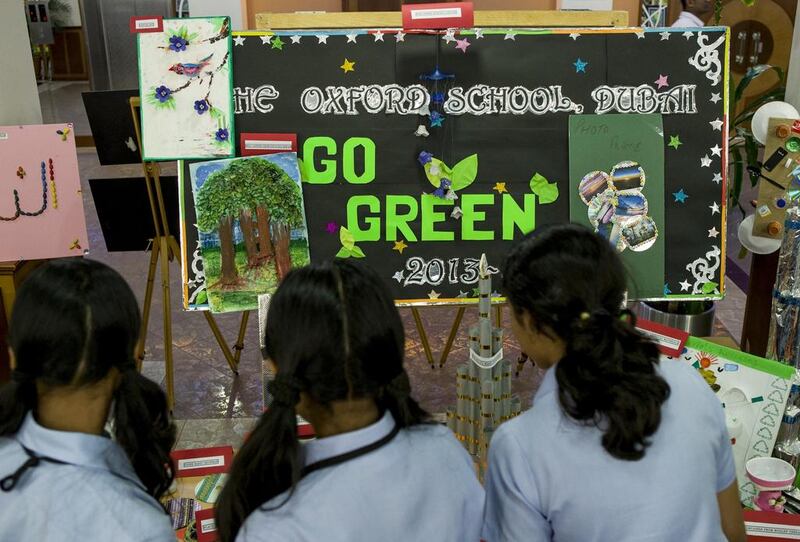ABU DHABI // More schools should introduce environmental subjects and teach about the importance of recycling as early as possible to produce caretakers for tomorrow’s world, educators say.
“It’s never too early to educate students on the benefits of recycling,” said D J, a science teacher at Glenelg School in Abu Dhabi. “The younger you start, the more natural it becomes and eventually it is just second nature.
“This is important as they are the ones who will be able to affect the future.”
D J, who has lived in Abu Dhabi for almost 20 years, teaches recycling and pollution in her social studies classes using the three Rs: reduce, re-use and recycle.
“Many students understand it as a concept but I’m not sure they understand how important it is to apply,” she said. “This is especially true for water, which isn’t as easily recycled as plastic, for example, and significantly more useful.”
K C, a British teacher, said that it was essential to teach recycling as part of the curriculum.
“I think it is really important to educate children on recycling so they can become responsible individuals who are aware of their surroundings and know ways that they can help improve them,” she said.
K C has taught English and environmental science in the UAE for the past five years, and said the programme created a domino effect across generations.
“Hopefully, if the children understand and are engaged by what they have learnt, they will teach their parents about it and recycling can become a family activity,” she said.
D J said interest levels in environmental knowledge among pupils vary but eventually almost all get hooked.
“There are quite a few who don’t believe certain things, like global warming – can you imagine?” she said. “There are different approaches to how you can communicate the message and usually one of these strategies ends up hooking them in, luckily.”
She said all pupils had some scepticism about the environment, so as a chemistry teacher it was her job to dispel unfounded ideas and promote responsibility.
At K C’s school in Abu Dhabi, pupils are taught about recycling and its benefits.
“I believe more recycling would be happening as people would be more educated on the topic, although I do think the country as a whole needs to support this more by providing recycling bins in housing complexes and schools,” she said.
She said children enjoyed the responsibility of recycling, which gave them tools to learn about the topic and the ability to become leaders.
Dr Rashid bin Fahad, Minister of Environment and Water, said including responsible waste management in school curriculums was crucial.
“The ministry places great importance and focus on the waste-management issue as one of the most pressing priorities in the UAE, given its economic, social, environmental and medical effects,” Dr bin Fahad said.
The ministry organises awareness programmes for families and individuals and has developed a national regulatory framework for waste management.
“We all hope that we can strengthen the cooperation between the public and private sector in that domain and encourage private companies to play a more vital role in waste management in a way that exceeds corporate social responsibility initiatives,” Dr bin Fahad said.
nalwasmi@thenational.ae





